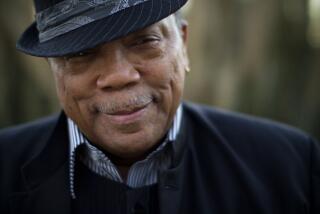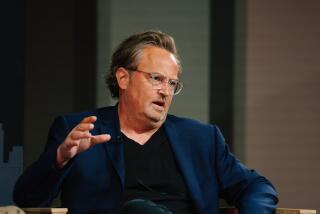Michael Jackson’s doctor was much admired but financially strapped
- Share via
In the Holmby Hills chateau where Michael Jackson lived his final months, Dr. Conrad Murray seemed a benevolent figure.
The physician arrived at night dressed in scrubs or a neat blazer and slacks, offering a ready smile for the household staff, and sometimes, gifts for Jackson’s children. Most of his time was spent upstairs in the singer’s private quarters, but occasionally he sat at the dining room table chatting with the family in his lilting Caribbean accent.
FOR THE RECORD:
Michael Jackson: A story in Monday’s LATExtra section about Michael Jackson’s personal physician said that at the time of his death, the singer had not performed in concert for a dozen years. Jackson last toured in 1997, but he gave two concerts at Madison Square Garden in 2001. —
“They loved him,” Kai Chase, the singer’s personal chef, recalled last summer. “A very nice man, very charming, very well-groomed, very respectful, well-spoken.”
The image of the respectable, competent doctor -- a profession Murray began striving toward as a youth in Trinidad -- started to crack the day the world’s most famous entertainer died in Murray’s care, and is likely to break further Monday when L.A. County prosecutors are expected to charge him with involuntary manslaughter.
“Here’s a guy who was on top of the world . . . talk about a fall from grace,” said his attorney, Ed Chernoff.
The job Jackson offered Murray, 56, last spring was a lifeline for a man struggling financially.
Courts in Las Vegas, where he lived with his physician wife, 19-year-old son and 13-year-old daughter, had ordered him or his business to pay $435,000 to creditors, including a student loan.
His home near the 18th hole of a country club was in jeopardy. Property records show he had refinanced the mortgage at least three times in five years and owed close to $1.7 million on a property now assessed at $1.08 million. By the time the Jackson job came along, it had been months since Murray had paid the mortgage and foreclosure proceedings loomed, according to court records.
He had also fallen behind on child support payments. Birth certificates and other public records indicate that in addition to the two children he had with his wife, Murray had fathered at least four children with three other women.
Files from Las Vegas family court proceedings show he owed thousands of dollars to a California woman with whom he had a son, now 11. He was also helping support two daughters, ages 16 and 8, who lived with their mother in Las Vegas, according to the records. And last March, an actress from Santa Monica gave birth to Murray’s son, according to a California birth certificate.
According to his lawyer, many of Murray’s financial problems arose from providing medical care for the poor. (Murray declined repeated requests for interviews, as did members of his family, but he did respond to some questions posed to him through his attorney.)
Multiple practices
Born in Grenada, he was raised in Trinidad by his grandparents and later by his mother and stepfather, according to a biography provided by his attorney. He had no contact with his own father until he was 25, although he knew as a child that his father was a doctor who lived in Houston.
In addition to his Las Vegas cardiology practice, Murray treated patients two days a month at a Houston heart clinic. He founded the clinic in 2006 in a poor, predominantly African American area in honor of his father, by then deceased.
Among some of his clinic patients, Murray was adored for his accessibility and bedside manner. He gave patients his personal cellphone number and used plastic heart models and charts to help elderly patients understand their ailments, patients recalled.
“He was really kind and sat there and explained. No rushing you. He would hold a good conversation. A whole lot of doctors could learn something from that type of treatment,” said the Rev. Prince James, a 67-year-old Baptist minister.
Few at the Houston clinic could pay Murray’s normal rates, and he lost money with nearly every patient he saw.
But when it came to setting a price for one very famous patient, Murray did not offer a discount, according to people involved in his hiring.
Frank DiLeo, Jackson’s manager, said last summer that Jackson told him Murray wanted $5 million to work during rehearsals and the eight months of concerts. “I said, ‘Michael, for $5 million, I’ll buy you a hospital,’ ” DiLeo recalled. “He said this guy was his family doctor, and he was comfortable with him. It made sense to me, to a degree.”
Murray’s lawyer disputed that the doctor demanded $5 million.
A special patient
Jackson and Murray had met four years earlier after Jackson took up residence in Las Vegas. Jackson came down with a viral infection, and a security guard recommended his friend Murray, according to a person with knowledge of their relationship who spoke on condition of anonymity because of the continuing criminal investigation. Murray treated Jackson, and the two men stayed in touch.
When Jackson approached Murray about the job, the singer was gearing up for what the music industry regarded as his final shot at a comeback. Rehearsals were long and physically exhausting, and many thought Jackson, who was 50 and hadn’t performed live in concert for a dozen years, wouldn’t be able to pull off the performances.
The singer wanted Murray as his doctor and Murray needed the money. Murray’s lawyer said the doctor also felt compelled to help.”They were close friends. Dr. Murray loved Michael,” Chernoff said.
Jackson’s concert promoter, AEG Live, had advanced him money to mount the shows and cover living expenses. In Los Angeles, he was renting a $20-million mansion and traveling in chauffeured SUVs. Randy Phillips, chief executive of AEG Live, said the performer introduced Murray to him and to the company’s general counsel as “my longtime personal physician” and insisted that the doctor accompany him to England. Phillips said he saw that as a needless expense and urged Jackson to rely on local physicians in London, but the singer was unwavering.
“He insisted emphatically that Dr. Murray be his physician,” Phillips recalled last summer.
Jackson and the promoter agreed to pay Murray $150,000 a month. In June, the month after he had accepted the job and begun work, Murray sent a letter to his Las Vegas patients announcing that he was shuttering his practice.
“Because of a once in a lifetime opportunity, I had to make a most difficult decision to cease [the] practice of medicine indefinitely,” he wrote.
Ten days later, Jackson was dead, and a day after that, Murray became a household name.
Police summarized the doctor’s account of his dealings with Jackson in court affidavits: Jackson, the doctor told them, was an insomniac who had called upon many physicians over the years to give him an operating-room anesthetic, propofol, as a sleep aid.
Murray said he administered the white liquid -- “milk” as Jackson called it -- each night by intravenous drip, but after six weeks, he had become concerned that the singer was addicted to it and tried to wean him off the drug. Jackson, he told police, demanded propofol the morning of his death and then stopped breathing when Murray left him alone for two minutes to use the bathroom.
When his account became public, many doctors condemned Murray’s use of propofol as reckless and unethical. Authorities began building a manslaughter case against him, and the media trailed him wherever he went.
Jackson had not signed their contract so Murray never collected any money for his work. According to his lawyer, Murray spent six months “ watching his bills pile up” before re-opening his Houston practice.
“His one big fault is that he could never turn down someone who needed his services,” his lawyer said.
Times staff writers Kimi Yoshino in Los Angeles and Ashley Powers in Las Vegas contributed to this report.
More to Read
Sign up for Essential California
The most important California stories and recommendations in your inbox every morning.
You may occasionally receive promotional content from the Los Angeles Times.











